It can sometimes be useful to help someone get started with the wonderful and fascinating typesetting and document composition system that is ConTeXt.
There is not much literature to help you get into it, hence my initiative.
The problem is that I've only been using ConTeXt for a short time and still have many doubts, so it's possible that the introduction may contain errors.
Initially written in Spanish, this document interested several people, and in order to increase the potential audience, a member of the ntg-context mailing list (native English speaker, who wishes to remain anonymous) has proceeded to translate my text into English.
| Czech - Česky v1.6 | English v1.6 | French - Français v1.6 |
|---|---|---|
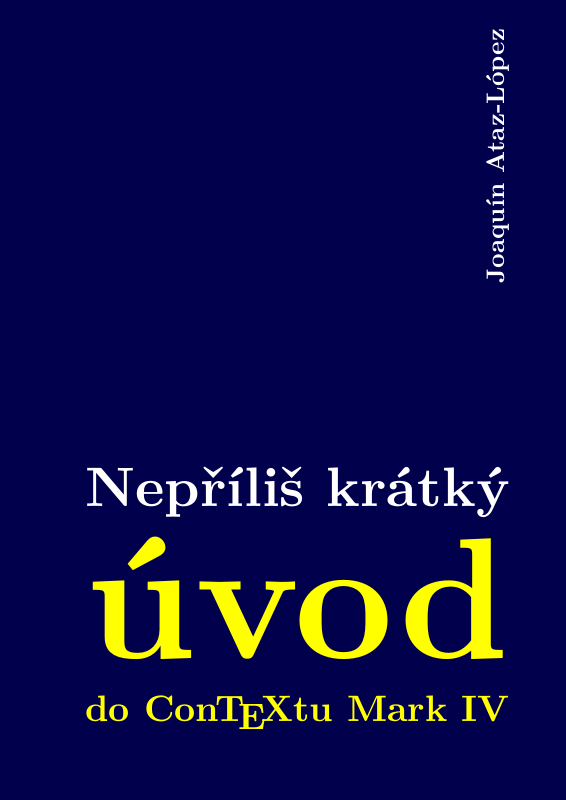 |
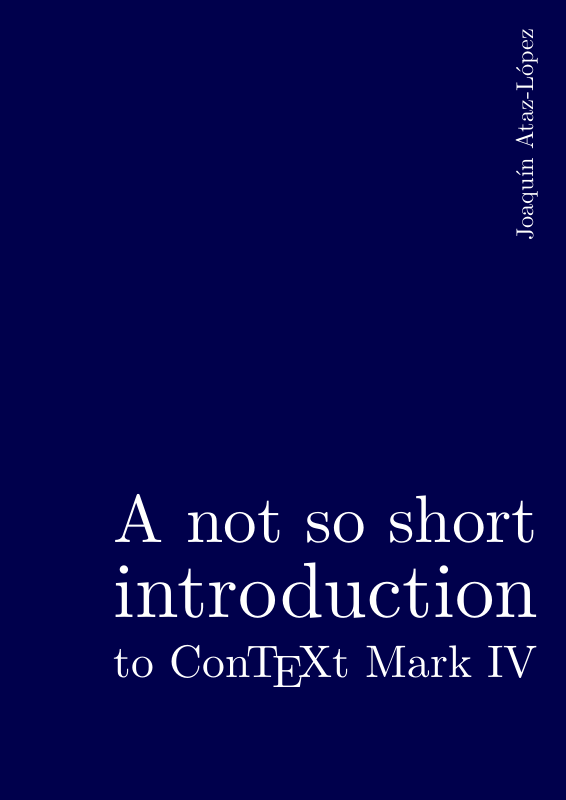 |
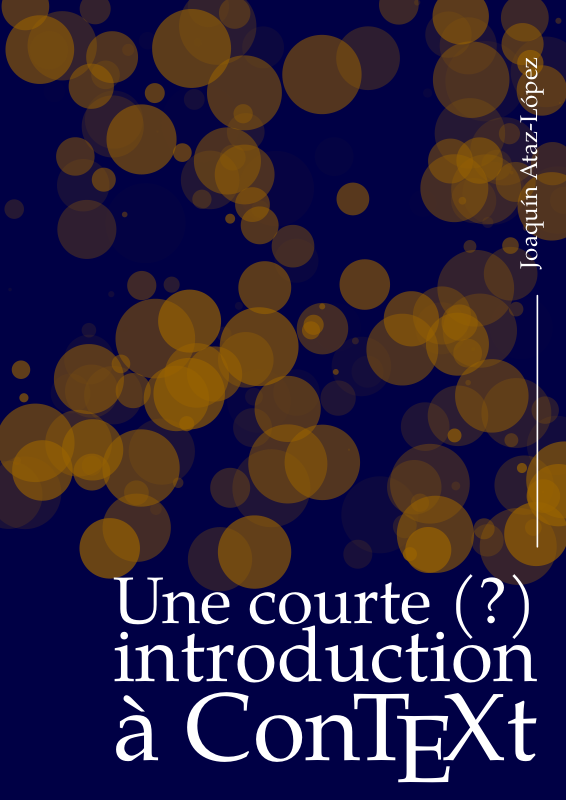 |
| Russian - Русский v1.6 | Serbian - Српски v1.6 | Spanish - Español v1.6 |
|---|---|---|
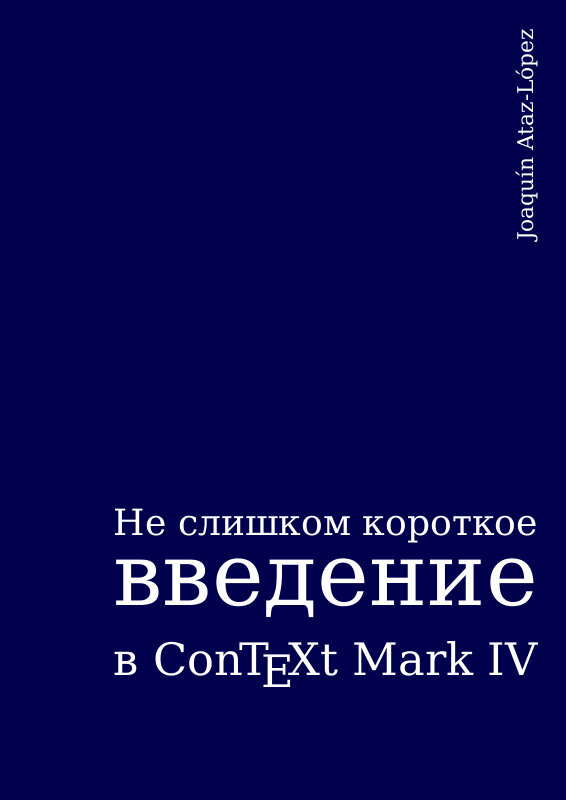 |
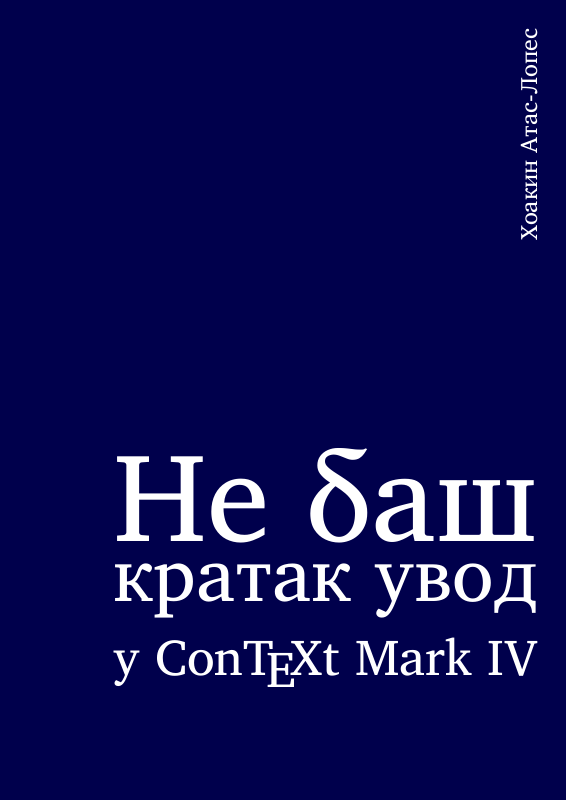 |
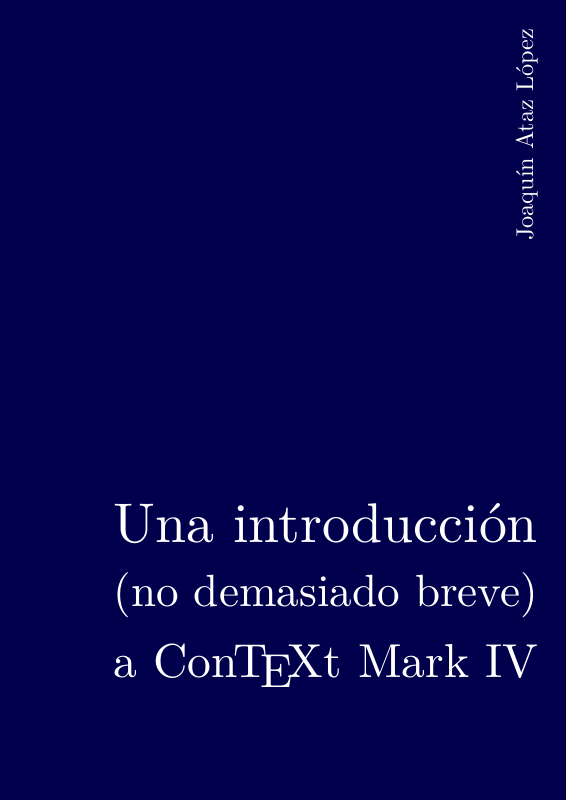 |
| French v2.0alpha | ||
|---|---|---|
 |
- Author : ©2020–2021, Joaquín Ataz-López
- Original title: Una introducción (no demasiado breve) a ConTeXt MarkIV
- English Translation: A good friend who wishes to remain anonymous.
The author of this text (and its English translator) authorises its free distribution and use, including the right to copy and redistribute this document in digital format on condition that its authorship is acknowledged, and that it is not included in any software package or suite, or in documentation whose conditions of use or distribution do not include the free right of recipients to copy and distribute. Authorisation is likewise given for translation of the document, provided that the authorship of the original text is indicated, and that the translated text is distributed under the FDL licence of the Free Software Foundation, the Creative Commons licence that authorises copying and redistribution, or a similar licence.
The above notwithstanding, publication or marketing or translation of this document in paper form will require the author's express authorisation in writing.
It is not a totally free licence since it does not allow it to be marketed in paper form. The point is to prevent some "smartass" from publishing this document as a book. However, apart from this restriction, I believe that the licence continues to reflect quite well the spirit of the FDL licence, in considerably less space.
- August 18, 2020: Version 1.0 (Spanish only)
- Original document.
- August 23, 2020: Version 1.1 (Spanish only)
- Correction of minor errors, typos and misunderstandings by the author.
- September 3, 2020: Version 1.15 (Spanish only)
- More errors, typos and misunderstandings.
- September 5, 2020: Version 1.16 (Spanish only)
- More errors, typos and misunderstandings as well as some very minor changes to make the text clearer (I hope).
- September 6, 2020: Version 1.17 (Spanish only)
- The number of minor errors I am finding is incredible. I would just need to stop re-reading the document to find no more!
- October 21, 2020: Version 1.5 (Spanish only)
- Introduction of suggestions and correction of errors reported by NTG-context users.
- January 2, 2021: Version 1.6
- Corrections suggested after a new and careful reading of the document, on the occasion of its translation to English. This is the first version in English.
- July 4, 2021: Version 1.6
- 1.6 version translated to French
- additionnal content, updated layout, reorganized source code only available in French
- July 31, 2021: Version 2.0alpha (French only)
- Global reorganization of the content. Attention: the content still needs to be reviewed and adapted to fit this new reorganization.
- December 13, 2021: Version 1.6
- Version 1.6 translated to Serbian
- August 18, 2020: ES-TEX Archives
- October 14, 2020: ntg-context Archives
- January 3, 2021: ntg-context Archives
The original idea of this repository was to provide a platform that would allow different collaborators to translate the text into different languages. Whether or not git is the best solution for that purpose, I really don't know. What I would appreciate is a guide on "how to set up a documentation translation project with git?" or any other solution which may more appropriate.
I would appreciate, of course, any suggestions for improvement.
The document is free and anyone who wants to include it in any ConTeXt distribution can, of course, do so. Also, if anyone wants the source files, I have no problem providing them: that's why this git repository was set up.
I have not based my introduction on LMTX because I think that for beginners a more stable system, like LuaTeX, is preferable.
I could eventually clarify any doubt that the various translators had about the meaning of the original. It should also be taken into account that in the original there are some fragments or examples designed for a Spanish cultural field that, outside it, do not make much sense. In this regard, the English translation has the merit of adapting these fragments (instead of translating them) or deleting them, as the case may be.
What I don't think is to coordinate the repository: I have never worked on collective projects and I hardly know how github works.
Having a repository can be useful to keep a version that is always up to date; but that, on the other hand, would force me to be continually modifying the text, which in principle is not my intention. I do not exclude that there will be other versions in the future, but for the moment this is not part of my plans.
And if there were other versions, it would be more to add some chapter; mainly I think that the most important material that is missing is the one related to XML, Lua and Metapost, that is: the three additional languages in which a ConTeXt document can be written.
But I am far from being able to write anything about any of those three aspects. Some member of the ntg-context mailing list has offered to help me with it, but not immediately (we all have a lot of work).
GarulfoPR trial done